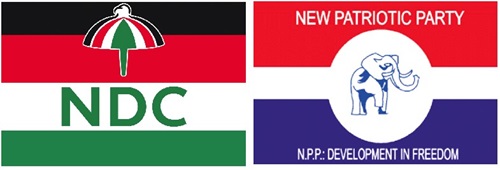My mother’s party lost the Akwatia by-election.
They will survive, bounce back, and win a future election in Ghana.
However, there are worrying signals that should not be ignored.
In the past
Let’s look at some findings from the Afrobarometer survey, as I argue that Ghana’s political landscape has been very New Patriotic Party (NPP) friendly.
When asked which party Ghanaians feel close to, between Round 1 (1999) and Round 9 (2022) majority chose the NPP, eight times.
Even in Round 9 (2022), when perceptions of the government’s performance were poor, trust in institutions had dropped to historic lows, perceptions of corruption had worsened, and there was high dissatisfaction with the way democracy was working, the NPP was still the preferred party to the National Democratic Congress (NDC) by a 49 per cent-40 per cent margin.
In Rounds 4 and 5 (2008, 2012), even though the NPP lost the election, Ghanaians preferred them over the NDC. In Round 5 & 6 (2012, 2014), the NDC was the incumbent party, but Ghanaians preferred the NPP. The point is this – whether in opposition or in power, the NPP regularly emerged as the preferred party.
Between Round 3 (2005) and Round 8 (2019), whenever Ghanaians were asked which party’s candidate they intended to vote for, the majority, with varying margins, always said the NPP. Again, even in years when the party lost the election, voter intentions favoured them.
CDD-Ghana’s pre-election surveys (October 2016 and 2020) further illustrate this pro-NPP political landscape. Consider for a moment these key highlights-
• In 2016, only 46 per cent said they strongly liked the incumbent candidate (John Mahama) compared to 58 per cent who expressed the same about the incumbent (Nana Akufo-Addo) in 2020.
• In 2016, 57 per cent said they strongly liked the main opposition candidate (Nana Akufo-Addo) compared to 43 per cent who said the same about the main opposition candidate (John Mahama) in 2020.
• In 2016, 55 per cent said the incumbent party (NDC) looks out for all Ghanaians, compared to 59 per cent who said the same in 2020 about the incumbent party (2020).
• In 2016, 70 per cent of Ghanaians said the main opposition party (NPP) looks out for all Ghanaians. In 2020, 52 per cent said the same about the main opposition party (NDC).
This is what regularly led me to assert that the NPP appeared to have an electoral upper hand over their main political rivals, the NDC, even when election outcomes did not validate this assertion.
Something is changing. It may be episodic and temporary, but it is, in my opinion, noteworthy.
The present
In Afrobarometer Round 10 (2024), on the party preference question (which political party do you feel close to), Ghanaians, for the first time since 2002, chose the NDC.
What is even more concerning is the shift among 20 demographic groups I examined when the Round 7 (2017) survey results are compared to Round 10 (2024). Here are three illustrative examples.
• In 2017, among Ghanaians living in urban areas, the NPP held a 70 per cent – 27 per cent edge over the NDC. In 2024, the NDC closed the gap to 50 per cent -47 per cent.
• In 2017, among men, the NPP held a 64 per cent – 34 per cent edge over the NDC. In 2024, the NDC held a 53 per cent-44 per cent edge over the NPP.
• In 2017, among Ghanaians with a post-secondary education, the NPP held a 69 per cent – 29 per cent edge over the NDC. In 2024, the NDC held a 50 per cent-45 per cent edge over the NPP.
In addition, after constantly expressing intentions of voting for the NPP between Round 3 (2005) and Round 8 (2019), Ghanaians shifted to express voting intentions for the NDC in Round 9 (2022) and Round 10 (2024).
Against this backdrop came the heavy electoral defeat in 2024. And when the results of Afrobarometer Round 10 (2024) are disaggregated by regions, and a comparison is made between those won by President John Mahama and those by Dr Mahamudu Bawumia, on several questions, the results of the election should not surprise anyone.
What next?
I agree with the familiar voices of the NPP who argue relentlessly that there is nothing unusual about losing a by-election, especially as an opposition political party.
Their caution about not overreading what the results mean for the future of the party is instructive and noteworthy.
I do not believe that the heavy electoral loss in 2024, followed by the outcome of Ablekuma North and Akwatia, are the events that will seal the death of the party.
A party that has endured electoral defeats (1992, 1996, 2008, 2012, 2024), notwithstanding their rejection of two (1992, 2012), will surely survive.
More importantly, Ghana’s democracy needs a strong and vibrant political opposition and cannot afford the luxury of a single dominant political party.
However, something is changing, and it will serve the party well to get its pulse on this current political landscape and devise a strategic response to deal with it.
The writer is the Project Director, Democracy Project.

